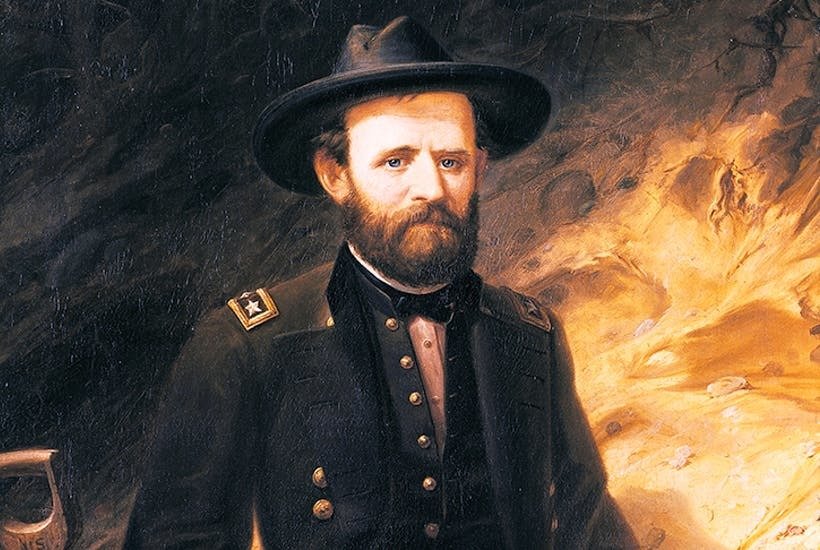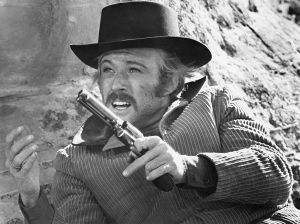Last year, more than 6,000,000 people visited the Lincoln Memorial in Washington DC. By contrast, barely 80,000 went to General Ulysses S. Grant’s tomb in New York City. Some would argue that the neglect is no better than Grant deserves. But others, notably Ron Chernow, believe it’s time for a rehabilitation.
Why do Americans pay so little attention to the man who beat the South in the Civil War and went on to become the 18th president of the United States? At least part of the answer can be found in the terrible alchemy of war. It spews out vast quantities of lead but, for some people, also spins gold.
Grant was a failure in his early life. He was born in Ohio in 1822 to a domineering father and emotionally distant mother. The family pulled their one string to get him into West Point, the US military academy. He did not distinguish himself there, but a paperwork error led to his first name being changed from the prosaic Hiram to the more dashing sounding Ulysses.
After West Point, Grant acquitted himself adequately during the 1846–48 Mexican War and miserably afterwards as a quartermaster in a lonely military outpost on the Canadian-Californian frontier. By the time he was pushed out of the army in 1854, he had become a full-blown binge drinker. He could control himself around his wife and children, but for the rest of his life he struggled with sobriety. Without the rigidity of military life to keep him focused, Grant struggled anyway. He stumbled from venture to venture until he ended up in Galena, Illinois, aged 38, working in his father’s leather goods store as a junior assistant. His annual salary of $800 barely covered the family’s expenses.
But then the war came in 1861, and the rumpled, sad-looking man behind the counter stepped out into the sunshine. Grant’s rise through the ranks was meteoric. By March 1864, President Abraham Lincoln had made him lieutenant general, the first American to hold the rank since George Washington. A year later Grant had the South prostrate at his feet. As the saying goes, ‘cometh the hour, cometh the man’.
The Civil War made Grant, because it allowed his latent talent for command and control to come to the fore, just as the second world war rescued Dwight Eisenhower (another general who became president) from a life of boredom behind a desk. However, there are two opposing views as to what Grant’s abilities really were. One school of thought accuses him of being a ruthless killer, who won by bleeding the South dry while needlessly sacrificing the lives of thousands of Northern soldiers along the way. The other, championed by the late Sir John Keegan, puts him on a par with the Duke of Wellington, citing Grant’s talent as a strategist and master of geography.
The raw statistics of the Civil War certainly tell against the general. More than 620,000 men were killed in the fighting, roughly 2 per cent of the population. (A similar ratio today would result in 6,000,000 American dead.) More than 153,000 of these casualties were Union soldiers under Grant’s command. The Confederates opposing him lost another 190,000. To fight with or against Grant was to wade knee-deep through a slurry of blood and bone.
On the other hand, as Chernow rightly insists, the claim that Grant simply had a bigger army to lose is pure lost-cause propaganda, peddled by Confederate apologists after the war. Grant fought seven major battles, starting with the brilliant strategic capture of Forts Donelson and Henry in Tennessee in 1862, which paved the way for the Union to take control of the western half of the Confederacy. It was after the Fort Donelson victory that he earned the sobriquet ‘Unconditional Surrender Grant’ for his granite-like refusal to accept any other terms.
People became less enamoured of Grant’s tenacity as the war ground on with no obvious end in sight. In June 1864, his Army of the Potomac suffered a humiliating defeat at the hands of the Confederate general Robert E. Lee in the slaughter-fest known as the Battle of Cold Harbor. Not only did he lose thousands in a single day; he also refused to agree to a truce for four more days, condemning the wounded to a slow, agonising death on a 75-yard strip of no-man’s land. Instead of ‘Unconditional Surrender Grant’, people began calling him ‘Butcher Grant’.
It’s what Grant did next that makes him a great general; he collected his army and continued marching south to Richmond, the capital of the Confederacy. He always found a way, regardless of how it looked to others. Chernow explains Grant’s strategy by quoting another Union general, William T. Sherman, the man who burnt Scarlett O’Hara’s Atlanta: ‘While Lee attacked the front porch, Grant would attack the kitchen and bedroom.’
It’s also what Grant did after he achieved the final victory over Lee at Appomattox in April 1865 that elevates him above other military men; he treated the defeated Confederates with dignity and unaffected magnanimity. By doing so, he won the trust of many Southerners, including Lee himself. Peace wouldn’t have been possible if the terms of their surrender had merely created a million trigger-happy guerrillas.
Grant’s reputation would never be higher than it was in 1865. Yet astute readers of Chernow’s biography will notice that at this apogee of Grant’s life there are still another 450 pages to go. In the hands of a lesser writer the final 20 years could have been a slog. But Chernow’s genius lies in his unparalleled mastery of storytelling. Quite simply, he is a biographer’s biographer who sets the standard for others to follow.
Rather than being a dull amble through the minutiae of American politics, the last half of the book provides a fascinating look at democracy at its most dysfunctional. There are aspects of Andrew Johnson, who became president after Lincoln’s assassination, that have eerie echoes in today’s Washington. ‘Johnson portrayed himself as a tribune of the common people; his selective populism encompassed poor whites but excluded blacks.’ He betrayed every promise made at the start of his presidency, and only survived impeachment by one vote.
Grant entered the White House in 1868 on a wave of national hope and goodwill. People were sick of politics and Grant seemed to offer an alternative to the Washington ‘swamp’ of professional politicians. Many of his cabinet picks were friends or businessmen with connections. On paper, this may have seemed like a good idea. But in practice, as we have seen when the ex-head of Exxon tries to run the State Department like a corporation, the slow accumulation of human capital (loyalty, experience, leadership, relationships) is quickly squandered for ill-defined short-term gains.
It isn’t that Grant had bad intentions; quite the reverse, in fact. He fought tooth and nail to protect the civil rights of freed slaves, supporting the 15th Amendment which guaranteed their right to vote, as well as the Southern reforms known collectively as Reconstruction. His administration secured more than 600 convictions against the Ku Klux Klan. But the post-war Grant gradually reverted to his pre-war self: hapless, naive and self-sabotaging. He understood how to be political in a military environment, but had absolutely no feel for politics. His two-term presidency turned into an eight-year spectacle of snouts in the trough. One
financial scandal hit after another, including an attempt by the railroad magnate Jay Gould, an associate of Grant’s brother-in-law, to corner the gold market.
The final victim of the gross financial chicanery that surrounded him was Grant himself. In 1884, a year before his death, he lost all but $80 in a giant Ponzi scheme run by a friend named Ferdinand Ward. In the face of utter ruin and humiliation, the cancer-riddled Grant rediscovered some of the qualities that had sustained him through the war. He had only months to live. But in that time he went to work and wrote his autobiography. Not just any autobiography; one of the greatest in American literature — all 336,000 words. Grant died two weeks after finishing the last page. The memoir was an instant smash, saving the family from poverty.
Chernow is scrupulous in detailing the long roster of Grant’s failures as a man, general and politician. But, rather like Philip Ziegler, who rounded off his biography of Lord Mountbatten with the injunction: ‘Remember, in spite of everything, he was a great man’, Chernow wants us to think of Grant’s life in the same way. He is surely right. In spite of everything, Grant is one of the great men of history. And yet, there will always be an asterisk next to his name.

























